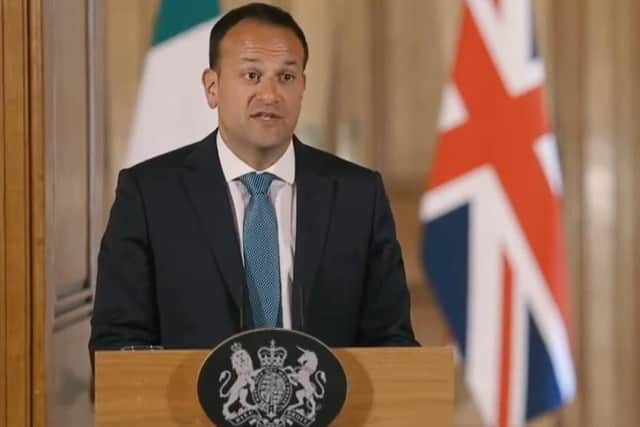'He tried to dismember the UK': Nigel Dodds on departing taoiseach Leo Varadkar's 'disastrous' legacy
and live on Freeview channel 276
Lord Dodds was reacting to news this morning, which came as a surprise to political observers, that Mr Varadkar is to step aside as both the leader of the Irish republic and his party, Fine Gael.
It is not clear exactly what precipitated his resignation.
But in a copy of a speech he gave today, issued by his office at 12.30pm, he said: “My reasons for stepping down now are personal and political, but mainly political.”


Advertisement
Hide AdAdvertisement
Hide AdIt comes after a catastrophic defeat for his government earlier this month in a nationwide referendum to change the Irish constitution.
Essentially, Fine Gael, Fianna Fail and the Greens (the coalition government) plus Sinn Fein, People Before Profit and the Social Democrats (the combined opposition) all wanted to rewrite the constitution.
Their plan was to take out the bit which referred to mothers as having an especially strong role in caring for children, and to change another bit to distance the idea of raising children from marriage.
The results were overwhelming: 68% rejected the first change, and 74% rejected the second – with every single constituency in the country (except for one southern suburb of Dublin) coming out with majorities against both the changes.
Advertisement
Hide AdAdvertisement
Hide AdMr Varadkar took up the posts of head of Fine Gael and taoiseach in June 2017, just over a year after the Brexit referendum.
He held the post until June 2020, then took a step back and served as tanaiste (deputy and foreign minister) while coalition comrade Micheal Martin of Fianna Fail took up the mantle of taoiseach.
In December 2022, he once again moved up a rank to become taoiseach again.
A new taoiseach is set to be appointed after Easter.
Lord Dodds, who was DUP deputy from 2008 to 2021, told the News Letter: “Leo Varadkar will go down I think as being one of the most unhelpful taoiseachs of recent years in terms of attitudes towards unionists, and in terms of building better relationships between unionists and the south.
Advertisement
Hide AdAdvertisement
Hide Ad"I think he fundamentally used Brexit as a means of trying to dismember the UK.
"He used Brexit as a means of trying to force the UK into adopting EU laws and rules, and if that can’t be achieved for the whole of the UK he wanted it for Northern Ireland – and sadly that has now come to pass.
"So I think his legacy is not a good one as far as relationships with unionists go, and we can only hope his successor adopts a much more constructive approach than the disastrous approach which has been the hallmark of Varadkar’s tenure in office.
"In contrast to this, Micheal Martin, the Fianna Fail leader, adopted a more constructive approach than Varadkar ever did.”
Advertisement
Hide AdAdvertisement
Hide AdUnionist animus towards Mr Varadkar was partly fuelled by his decision in 2018 to stress that there was a “real risk” republican violence could erupt if there was a “hard border” after Brexit.
At a summit of EU leaders, he brought with him a copy of the Irish Times, containing a story about a 1972 mass murder at a customs post in Newry, when an IRA bomb killed nine people (including three bombers).
He addressed this in an interview last year, when he said: “What I did was express concerns at the time that were held by the Chief Constable and the Garda Commissioner, that the reestablishment of border posts between north and south could lead to violence.
"But there’s a very big difference I think, between warning or expressing concern about violence, and threatening it, and I certainly didn’t do that.”
Advertisement
Hide AdAdvertisement
Hide AdHe was regularly accused of being inflexible about Brexit, and in 2022 – during the stand-off about the Protocol – said: “The British government had given commitments in the past that it would be even handed in its approach to Northern Ireland.
“I don’t think that’s the case when it comes to this government. They’re siding with one of the three blocs of opinion that now exist in Northern Ireland [meaning unionism].”